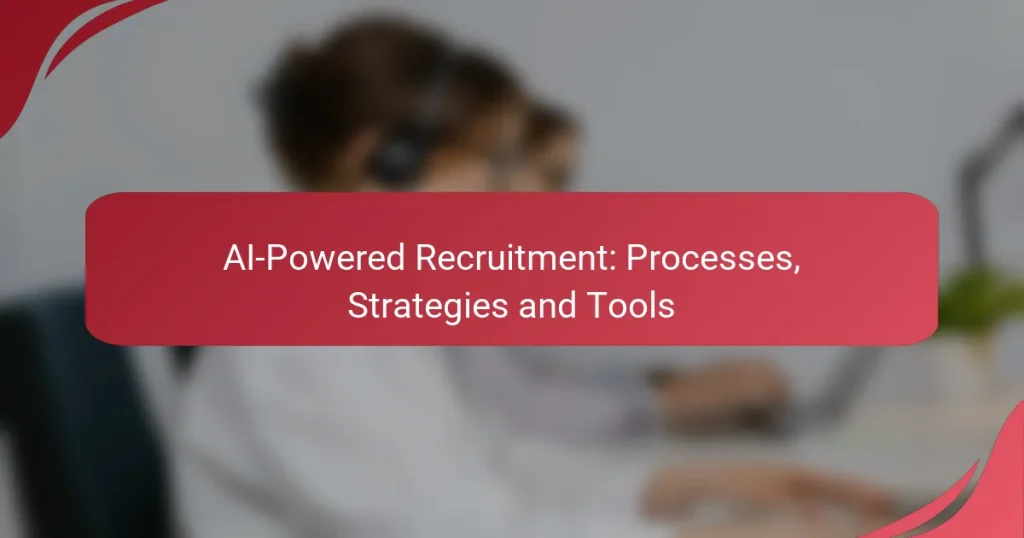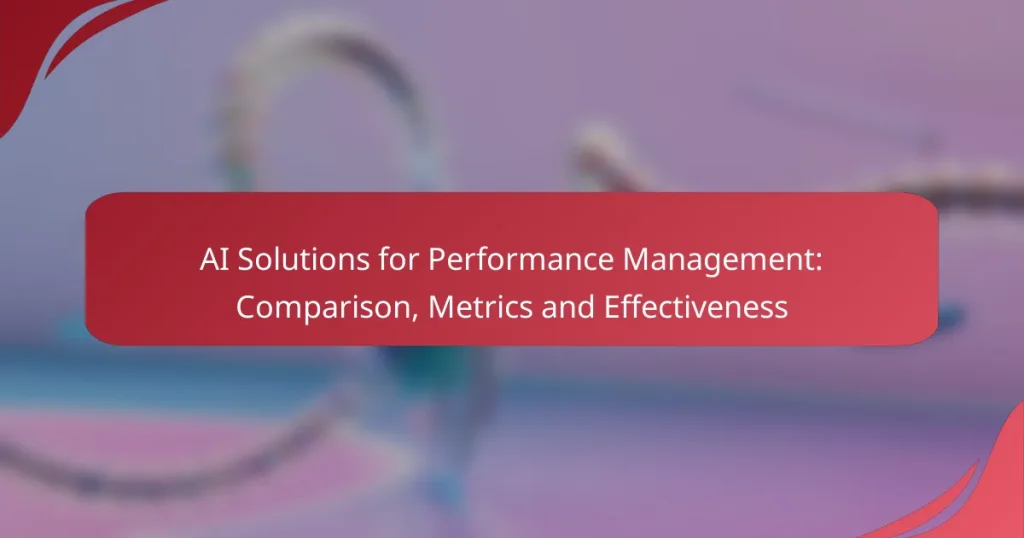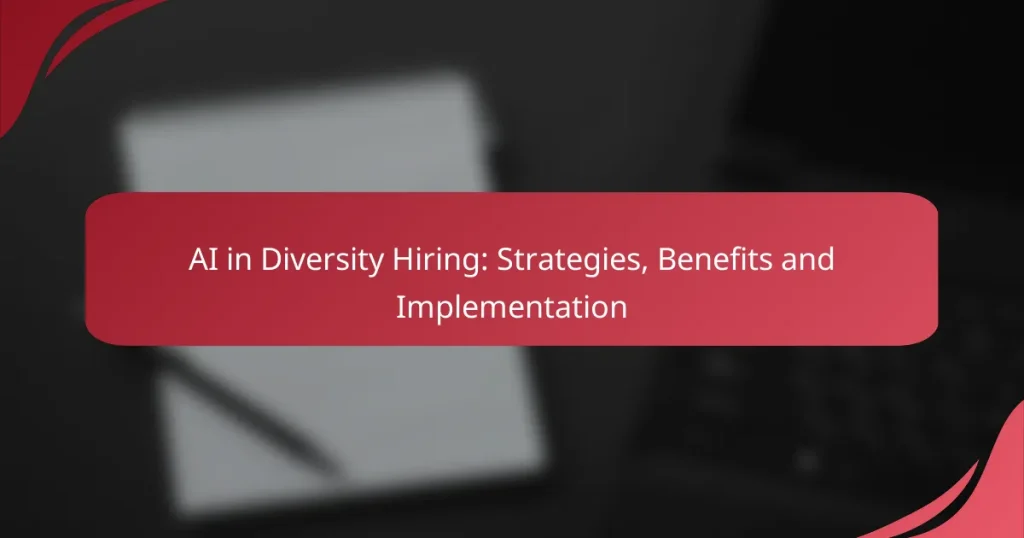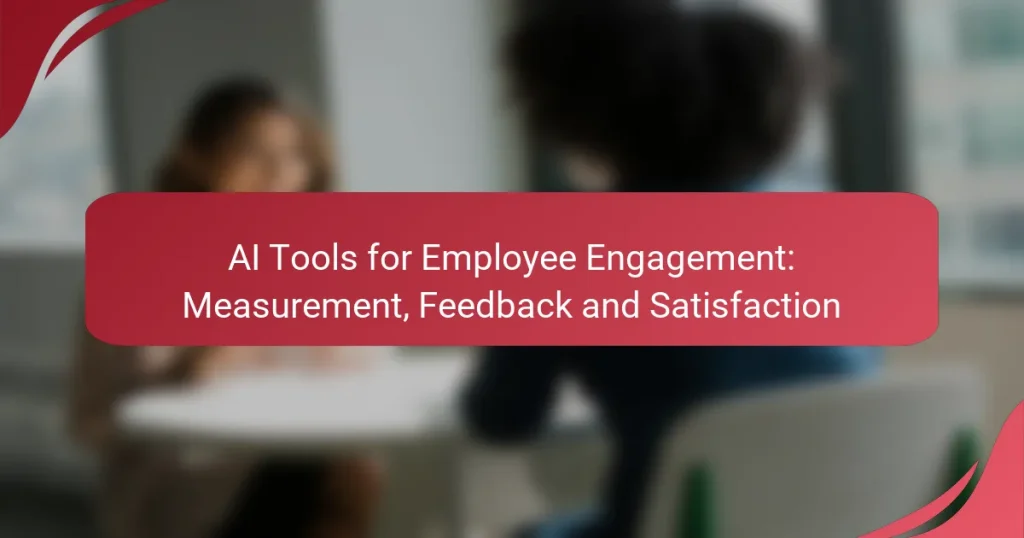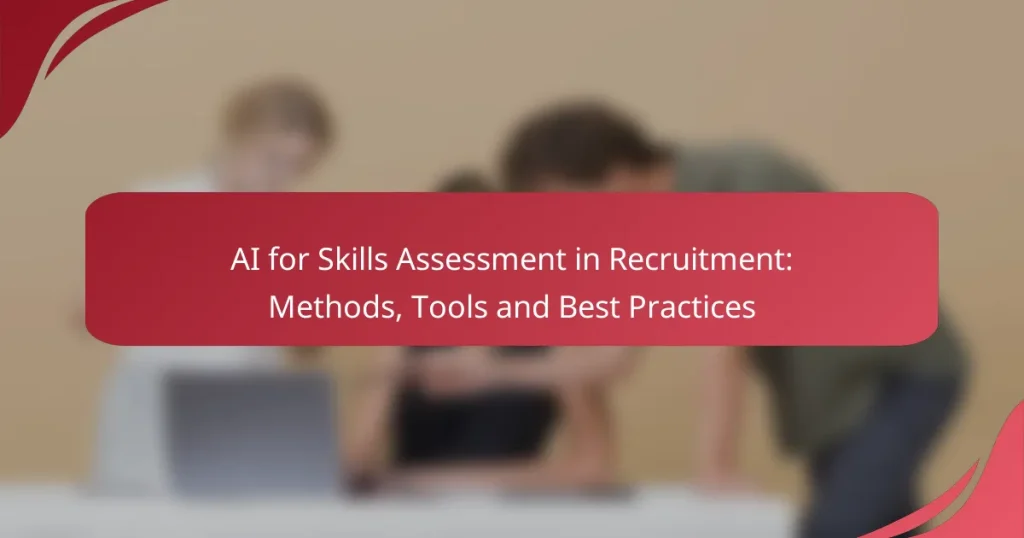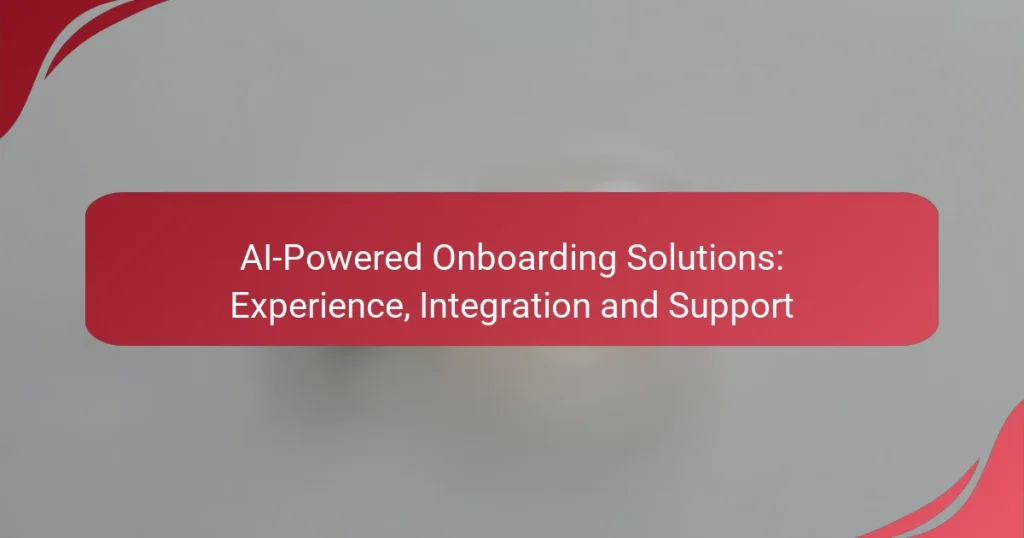AI-powered business solutions are transforming human resources management by streamlining recruitment, enhancing onboarding, and improving performance management. By utilizing advanced algorithms and data analytics, organizations can make more informed hiring decisions, personalize employee experiences, and foster a more engaged workforce. This innovative approach not only saves time and resources but also elevates the overall effectiveness of HR practices.
AI Solutions for Performance Management: Comparison, Metrics and Effectiveness
AI for Employee Retention: Strategies, Benefits and Transformations
AI in Diversity Hiring: Strategies, Benefits and Implementation
AI Tools for Employee Engagement: Measurement, Feedback and Satisfaction
AI for Skills Assessment in Recruitment: Methods, Tools and Best Practices
AI-Powered Onboarding Solutions: Experience, Integration and Support
How can AI improve recruitment processes in the US?
AI can significantly enhance recruitment processes in the US by streamlining candidate sourcing, improving selection accuracy, and elevating the overall candidate experience. By leveraging advanced algorithms and data analytics, organizations can make more informed hiring decisions while saving time and resources.
Automated candidate screening
Automated candidate screening uses AI algorithms to evaluate resumes and applications quickly. This technology can identify the most qualified candidates by analyzing keywords, skills, and experience, reducing the time spent on manual reviews. Companies often find that this process can cut screening time from several hours to just a few minutes.
However, it’s essential to ensure that the AI tools are programmed to avoid bias and comply with equal employment opportunity regulations. Regular audits of the screening process can help maintain fairness and transparency in hiring.
Predictive analytics for hiring
Predictive analytics in hiring involves using historical data to forecast candidate success and retention rates. By analyzing past hiring outcomes, AI can identify patterns that correlate with high performance, allowing HR teams to make data-driven decisions. This approach can improve the quality of hires and reduce turnover rates.
Employers should consider integrating predictive analytics tools with their existing HR systems to maximize efficiency. Regularly updating the data inputs ensures that predictions remain relevant and accurate.
Enhanced candidate experience
AI can enhance the candidate experience by providing personalized communication and timely updates throughout the recruitment process. Chatbots, for instance, can answer common questions and guide candidates through application steps, making the process more engaging and informative.
To further improve the experience, companies should ensure that AI tools are user-friendly and accessible. Gathering feedback from candidates can help refine these tools and address any concerns, ultimately leading to a more positive impression of the organization.
What are the benefits of AI in employee onboarding?
AI enhances employee onboarding by automating processes and personalizing experiences, leading to improved efficiency and engagement. Organizations can expect faster integration of new hires and a more tailored approach to their training needs.
Streamlined onboarding workflows
AI can automate repetitive tasks in the onboarding process, such as document collection and scheduling orientation sessions. This reduces the time HR teams spend on administrative duties, allowing them to focus on strategic initiatives.
For instance, AI-driven chatbots can answer common questions from new employees, guiding them through the onboarding steps without human intervention. This can cut onboarding time significantly, often reducing it to a matter of days instead of weeks.
Personalized training programs
AI enables the creation of customized training programs that adapt to the individual learning pace and style of each employee. By analyzing data on performance and engagement, AI can recommend specific resources and training modules tailored to each new hire.
For example, if a new employee struggles with certain software, the AI system can suggest additional tutorials or hands-on practice sessions. This targeted approach can enhance retention rates and ensure that employees are well-prepared for their roles.
How does AI enhance employee performance management?
AI enhances employee performance management by providing tools that facilitate continuous assessment and improvement of employee productivity. These technologies enable organizations to gather real-time data, analyze performance metrics, and deliver personalized feedback, ultimately fostering a more engaged and effective workforce.
Real-time feedback systems
Real-time feedback systems leverage AI to provide employees with immediate insights into their performance. These systems can track various metrics, such as task completion rates and collaboration levels, allowing managers to address issues promptly and recognize achievements as they occur.
For example, platforms like 15Five or Lattice utilize AI to automate check-ins and pulse surveys, ensuring that feedback is timely and relevant. This approach not only boosts employee morale but also helps in aligning individual goals with organizational objectives.
Data-driven performance evaluations
Data-driven performance evaluations utilize AI algorithms to analyze employee performance data comprehensively. By aggregating information from various sources, such as project management tools and employee surveys, these evaluations provide a holistic view of an employee’s contributions.
Organizations can implement AI tools that assess performance against predefined benchmarks, helping to minimize bias and subjectivity in evaluations. This method can lead to more equitable promotion decisions and targeted development plans, ultimately enhancing overall workforce effectiveness.
What AI tools are popular for HR management?
Several AI tools are widely used in HR management to streamline processes, enhance decision-making, and improve employee engagement. Popular solutions include Workday, Oracle HCM Cloud, and ADP Workforce Now, each offering unique features tailored to different organizational needs.
Workday
Workday is a comprehensive HR management platform that leverages AI to automate various HR functions such as recruitment, talent management, and payroll processing. Its user-friendly interface and robust analytics capabilities allow HR professionals to make data-driven decisions efficiently.
One key feature of Workday is its predictive analytics, which can forecast employee turnover and help organizations proactively address retention issues. Companies often find that implementing Workday can lead to significant time savings and improved accuracy in HR tasks.
Oracle HCM Cloud
Oracle HCM Cloud offers a suite of AI-driven tools designed to enhance workforce management and employee experience. This platform integrates various HR functions, including recruitment, performance management, and learning and development, into a single system.
A standout feature of Oracle HCM Cloud is its ability to provide personalized employee experiences through AI recommendations. For example, it can suggest training programs tailored to individual career paths, helping employees develop skills that align with organizational goals.
ADP Workforce Now
ADP Workforce Now is a popular choice for small to medium-sized businesses seeking an all-in-one HR solution. This platform utilizes AI to simplify payroll processing, time tracking, and benefits administration, making it easier for HR teams to manage employee data.
ADP’s AI capabilities include automated compliance updates, which help organizations stay informed about changing labor laws and regulations. This feature is particularly beneficial for businesses operating in multiple jurisdictions, as it reduces the risk of non-compliance and associated penalties.
How can businesses ensure ethical AI use in HR?
Businesses can ensure ethical AI use in human resources by prioritizing transparency, conducting regular audits for bias, and adhering to established ethical guidelines. These practices help to build trust and ensure that AI systems support fair and equitable decision-making in HR processes.
Transparency in AI algorithms
Transparency in AI algorithms involves making the workings of these systems understandable to stakeholders, including employees and management. This can include providing clear documentation on how algorithms make decisions, the data they use, and the criteria for outcomes.
To enhance transparency, organizations can implement user-friendly interfaces that allow HR professionals to interpret AI recommendations easily. For instance, when an AI tool suggests candidates for a position, it should clarify the factors influencing its recommendations, such as skills, experience, and cultural fit.
Regular audits for bias
Regular audits for bias are essential to identify and mitigate any unfair treatment that may arise from AI systems. These audits should assess the data used by the algorithms and the outcomes they produce to ensure they do not disproportionately disadvantage any group.
Businesses can establish a routine schedule for these audits, such as quarterly or biannually, and involve diverse teams in the review process to provide multiple perspectives. Additionally, organizations should be prepared to adjust their algorithms based on audit findings to promote fairness and compliance with ethical standards.
What are the challenges of implementing AI in HR?
Implementing AI in human resources (HR) presents several challenges that organizations must navigate. Key issues include data privacy concerns and the integration of AI tools with existing systems, both of which can significantly impact the effectiveness and acceptance of AI solutions in HR processes.
Data privacy concerns
Data privacy is a critical challenge when integrating AI into HR. Organizations must ensure that employee data is handled in compliance with regulations such as GDPR in Europe or CCPA in California. This involves implementing robust data security measures and obtaining explicit consent from employees regarding how their information is used.
To mitigate privacy risks, HR departments should conduct regular audits of their AI systems and data usage policies. Establishing clear guidelines on data access and usage can help build trust among employees and protect sensitive information.
Integration with existing systems
Integrating AI solutions with existing HR systems can be complex and resource-intensive. Organizations often face compatibility issues between new AI tools and legacy systems, which can hinder the seamless flow of information. It is essential to assess the current technological landscape before implementing AI solutions.
To facilitate integration, consider using middleware or APIs that can bridge gaps between different systems. Additionally, involving IT teams early in the process can help identify potential challenges and streamline the integration process, ensuring that AI tools enhance rather than disrupt existing workflows.
What future trends are emerging in AI for HR management?
Emerging trends in AI for HR management include the increasing integration of chatbots and AI-driven wellness programs. These innovations aim to enhance employee engagement, streamline communication, and improve overall workplace health.
Increased use of chatbots
Chatbots are becoming essential tools in HR management, providing instant responses to employee inquiries and automating routine tasks. They can handle a variety of functions, such as answering FAQs about company policies, scheduling interviews, and assisting with onboarding processes.
Implementing chatbots can significantly reduce the workload on HR teams, allowing them to focus on more strategic initiatives. Companies should consider the specific needs of their workforce when designing chatbot interactions to ensure they are user-friendly and effective.
AI-driven employee wellness programs
AI-driven wellness programs leverage data analytics to personalize health initiatives for employees, promoting better physical and mental health outcomes. These programs can analyze employee behavior and preferences to suggest tailored wellness activities, such as fitness challenges or mindfulness sessions.
Organizations implementing these programs should ensure they comply with privacy regulations and maintain transparency about data usage. Providing incentives for participation can also enhance engagement and effectiveness, leading to a healthier workforce and potentially reducing healthcare costs.
